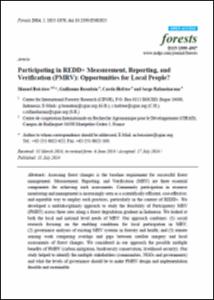Les arbres poussent-ils sur l’argent ?: Implications de la recherche sur la déforestation pour les politiques de promotion de REDD
This publication has two objectives. First, it analyzes the past research on deforestation and summarizes the findings of that research, in terms of its relevance to the development of future REDD regimes. Second, it highlights areas where future research and methodological development are needed to support national and international processes on avoided deforestation and degradation.


